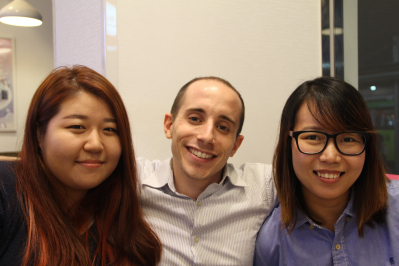
Seoulism is a webzine started in 2013 with 30 foreign student contributors who attend universities in Korea. The members discuss cultural and social matters of Korea in Korean to improve their Korean through writing and to communicate with other foreign students and Korean readers.
Rather than delivering stories in English, as most magazines written by foreign students do, Seoulism expresses their ideas in Korean.
“There have been many instances where Koreans make decisions without asking our opinions when we don’t vocalize our ideas in Korean,” said Tyler Rasch (Seoul National Graduate School), the editor-in-chief of Seoulism. “I think the best way to solve this problem is making our voices heard to Koreans.”
At first, Seoulism aimed to publish paper magazines regularly. However, financial issues only allowed the members to create a webzine instead, which is different from a paper magazine in content and promotion.
“Since the Internet is open to everyone, we could not limit the themes only to universities,” Rasch said. “For promotion, it is difficult to find new readers with the Internet, as Social Network Service is a way for keeping relationships with existing readers but not specialized in attracting new readers.”
Although contributors write once a week about any topic that interests them, the editorial staffs at times provide topics upon special holidays including New Years and Valentine’s Day.
“We updated writings on National Liberation Day in August,” Rasch said. “I think it’s something we must do as students studying Korean and writing about Korea.”
The contributors of Seoulism sometimes objectively analyze and criticize the Korean culture. In some cases, they have no choice but to be sparing in their articles, as different perspectives can cause unintended misunderstandings.
“One of our contributors from Japan once wrote about the Yasukuni Shrine when Koreans were sensitive about Japan’s prime minister visiting the shrine,” Rasch said. “She intended to introduce various purposes for visiting the shrines, rather than only the political implication. But we worried that the way she organized her thoughts might offend Korean readers, therefore we asked her to reorganize.”
Many people assume that Seoulism’s biggest problem would be the language barrier. However, members claim that the biggest obstacle is the absence of a systemic structure of the organization.
“We basically lack a systematic and organized system that can keep Seoulism running,” said Ju Hunny (Seoul National University, 4), the editor of Seoulism. “As most foreign students limitedly stay in Korea, it is hard to keep track of each contributor and conceive of any long term plans.”
The members are now trying to focus on two initial aims: improving foreign students’ Korean and communicating with Koreans.
“Rather than having ambitious aims that cannot be achieved, we think that by making those two aims solid, we are fulfilling our needs as global members in Korean society,” Ju said.
The members added a final word to Koreans, those who believe foreign students’ activity spectrum is somewhat limited compared to that of Korean students.
“When I first suggested the idea of founding Seoulism to my Korean friends, they all said it would not work,” Rasch said. “I hope Seoulism can prove to Koreans that foreign students can also do something by themselves in Korean society.”
Park Kyoung-eun
kathypark226@ewhain.net

